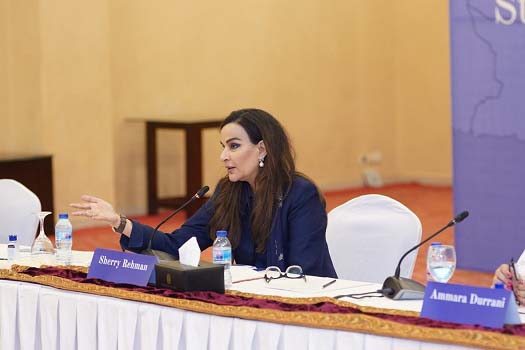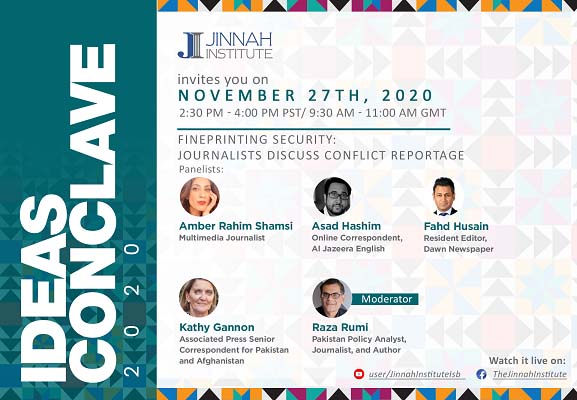Second day of Ideas Conclave 2020 brings leading experts together

Islamabad: The second day of Jinnah Institute’s Ideas Conclave 2020 commenced with a bilateral conversation on ‘Democracy and Inclusion’ between leading experts from Pakistan and India. Speakers of the session included former federal minister and leader of Senate opposition, Chaudhry Aitzaz Ahsan; founding member of the Human Rights Commission of Pakistan, Ms. Hina Jilani; and prominent Indian journalist and economist, Mr. Prem Shankar Jha. The session was moderated by senior fellow Tabadlab, Mr. Mosharraf Zaidi.

The participants discussed political tendencies in South Asia, where majoritarianism and populism had begun to change the structures of democracy. “It is the people themselves who harbour these prejudices; they are displayed in the public domain because an environment of ease has been built by the state,” stated Ms Hina Jilani, pointing towards social and political factors that exclude a large number of people from economic opportunities. “The root cause of divisive thought and fascism has been access to opportunity and dichotomy in language,” she said.
Former Senator Aitzaz Ahsan spoke about the slow decay of freedoms Pakistani society. “In the last six or seven decades we have allowed society to degenerate to an extent that we cannot leave such a Pakistan to our children.” He suggested that Indian society displays many of Pakistan’s challenges, and the two were remarkably similar in their intolerance and treatment of minorities.
Prem Shankar Jha discussed how voices of majoritarianism had always existed; the only difference was that they were now being used to systematically erode democratic structures. He also elaborated how societies in South Asia created dichotomies based on languages; speaking and writing and English for instance was an intrinsic advantage for greater job opportunities. Those that were left out as a result of these issues were targets for the Hindutva movement as potential recruits. “Do not give up hope on us (India) just yet,” he asked his co-panellists.
The second session of the day titled, “Connectography: Making Technology Work for Governance” featured a mix of experts working in the private, development and legal sectors whose work focused on technology. Director Programmes Jinnah Institute, Salman Zaidi started by mentioning the “historic disruption” occasioned by COVID in 2020, and stated that technology “was no monolith; nor it is inherently good or bad, rather its usage by state and society was a reflection of offline socio-political trends.
Sehar Tariq, employed at Facebook, explained that Pakistan was a populous country with a predominantly youthful population, but Pakistan’s overall rank in the Inclusive Internet Index indicated that its connectivity infrastructure needed far more investment to enable access for all.
Usama Khilji, Director, Bolo Bhi, highlighted that the pandemic revealed the deficits in internet facilities, particularly in areas not considered the geographical centre of the country. This was further evident when schools and universities switched to online instruction in Balochistan, Gilgit-Baltistan and smaller districts of Pakistan.
Director, Research Society of International Law, Oves Anwar identified delays in the judicial system and the differences in the use of technology at various levels of the courts, that led to a vastly different experience for individuals seeking justice. This could be bridged with apps and other technology enabled procedures, but this needed better understanding of technology by governmental stakeholders, and a move away from suspicion and over-regulation. “Regulatory laws disproportionately impact the marginalised and underprivileged segment of society,” stated Mr. Oves Anwar.
The participants highlighted the need to adapt and develop our own system of regulating the internet. “We can’t be inspired by anyone and just replicate what other countries have done. It has to be something that is geared to the local context and works for Pakistan,” explained Mubariz Siddiqui, General Counsel, Sarmayacar.
On the issue of banning mobile applications and platforms such as YouTube and TikTok, participants suggested that the challenge must be considered from both the economic and socio-political angles. “The development sector cannot do much unless the public stands behind them. We have collectively failed to create enough public pressure. There is a need to have a discourse on how human rights and civil liberties are not opposed to patriotism or the progress of Pakistan,” stated Sadaf Khan, co-founder, Media Matters for Democracy.





